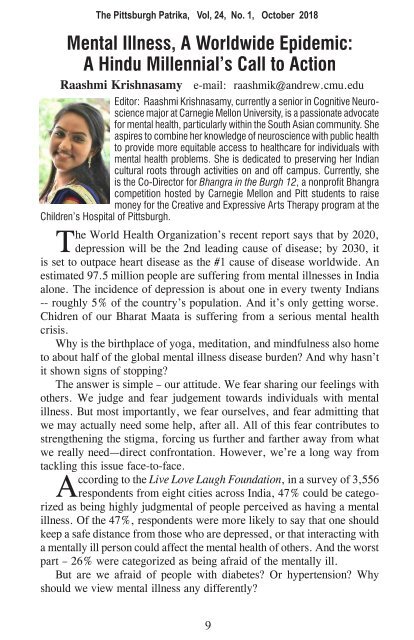Pittsburgh Patrika October 2018 issue
You also want an ePaper? Increase the reach of your titles
YUMPU automatically turns print PDFs into web optimized ePapers that Google loves.
The <strong>Pittsburgh</strong> <strong>Patrika</strong>, Vol, 24, No. 1, <strong>October</strong> <strong>2018</strong><br />
Mental Illness, A Worldwide Epidemic:<br />
A Hindu Millennial’s Call to Action<br />
Raashmi Krishnasamy e-mail: raashmik@andrew.cmu.edu<br />
Editor: Raashmi Krishnasamy, currently a senior in Cognitive Neuroscience<br />
major at Carnegie Mellon University, is a passionate advocate<br />
for mental health, particularly within the South Asian community. She<br />
aspires to combine her knowledge of neuroscience with public health<br />
to provide more equitable access to healthcare for individuals with<br />
mental health problems. She is dedicated to preserving her Indian<br />
cultural roots through activities on and off campus. Currently, she<br />
is the Co-Director for Bhangra in the Burgh 12, a nonprofit Bhangra<br />
competition hosted by Carnegie Mellon and Pitt students to raise<br />
money for the Creative and Expressive Arts Therapy program at the<br />
Children’s Hospital of <strong>Pittsburgh</strong>.<br />
The World Health Organization’s recent report says that by 2020,<br />
depression will be the 2nd leading cause of disease; by 2030, it<br />
is set to outpace heart disease as the #1 cause of disease worldwide. An<br />
estimated 97.5 million people are suffering from mental illnesses in India<br />
alone. The incidence of depression is about one in every twenty Indians<br />
-- roughly 5% of the country’s population. And it’s only getting worse.<br />
Chidren of our Bharat Maata is suffering from a serious mental health<br />
crisis.<br />
Why is the birthplace of yoga, meditation, and mindfulness also home<br />
to about half of the global mental illness disease burden? And why hasn’t<br />
it shown signs of stopping?<br />
The answer is simple – our attitude. We fear sharing our feelings with<br />
others. We judge and fear judgement towards individuals with mental<br />
illness. But most importantly, we fear ourselves, and fear admitting that<br />
we may actually need some help, after all. All of this fear contributes to<br />
strengthening the stigma, forcing us further and farther away from what<br />
we really need—direct confrontation. However, we’re a long way from<br />
tackling this <strong>issue</strong> face-to-face.<br />
According to the Live Love Laugh Foundation, in a survey of 3,556<br />
respondents from eight cities across India, 47% could be categorized<br />
as being highly judgmental of people perceived as having a mental<br />
illness. Of the 47%, respondents were more likely to say that one should<br />
keep a safe distance from those who are depressed, or that interacting with<br />
a mentally ill person could affect the mental health of others. And the worst<br />
part – 26% were categorized as being afraid of the mentally ill.<br />
But are we afraid of people with diabetes? Or hypertension? Why<br />
should we view mental illness any differently?<br />
9


















